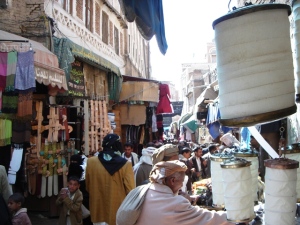I’m sure that in a philosophical conversation good Muslims will tell you there are redeeming features to Ramadan. But on a daily basis I suspect most of the people around me think Ramadan is a pain in the butt. It’s a month of hungry, crabby, under-caffeinated and under-nicotined grumpiness. And I’m lucky that both of the Ramadans of my service are winter ones, with short and cool days. I can’t even imagine a summer Ramadan.
One of the ways in which Ramadan complicates my life is transportation. Everybody gets fed up with life in the middle of the afternoon and starts closing up shop so they can grump along home and get ready for dinner as soon as the sun sets. Buses stop running at some nebulous time in there too. Some buses will resume trips for a couple of hours after sunset, when everybody feels human again, but even that seems to be at the whim of the bus owner and not entirely predictable. There’s no way to get anywhere if you’re trying to do it during iftar — or the key hours before and after it.
A secondary effect of this bus shortage is that it actually gets harder to get on a bus, even when they’re running. The drivers don’t love the fares they lose with the shortened days, and the best way to make fares up is to cram as many people as possible into every busload. Technically, standing on buses is illegal, but I’ve never actually seen a bus driver cited for letting people do it, and during Ramadan the practice is rampant. And because this involves cramming as many people as possible into a finite amount of space, it has a direct effect on women. Normally, if a woman has been waiting for a while, the bus driver or some other courteous man will help make sure she gets a seat in the scrum for bus real estate. But during Ramadan, a woman’s personal space means wasted inches. During Ramadan, bus after bus comes and crowd after crowd of men stampedes onto it and the few miserable women who have the crazy notion of wanting to get anywhere get more and more frustrated.





